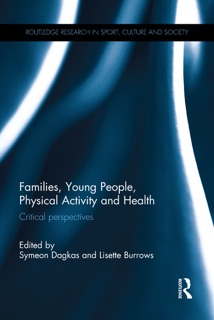The family is an important site for the transmission of knowledge and cultural values. Amidst claims that young people are failing to follow health advice, dropping out of sport and at risk of an ever-expanding list of lifestyle diseases, families have become the target of government interventions. This book is the first to offer critical sociological perspectives on how families do and do not function as a pedagogical site for health education, sport and physical activity practices.
This book focuses on the importance of families as sites of pedagogical work across a range of cultural and geographical contexts. It explores the relationships between families, education, health, physical activity and sport, and also offers reflections on the methodological and ethical issues arising from this research. Its chapters discuss key questions such as:
how active living messages are taken up in families how parents perceive the role of education, physical activity and sport how culture, gender, religion and social class shape engagement in sport how family pedagogies may influence health education, sport and physical activity now and in the future
This book is essential reading for anyone with an interest in health, physical education, health education, family studies, sport pedagogy or the sociology of sport and exercise.




